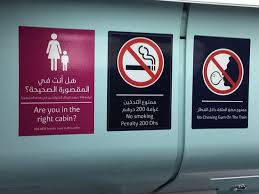Hello again from Dubai! For all of you who haven’t read my previous posts, my name is Josephine, I’m 23 and the current intern at Lufthansa Cargo in Dubai.
An internship in the cargo industry, specifically here in Lufthansa Cargo offers you plenty of options and allows you to embrace your personal passions and interests.
Obviously I only had a glimpse of an idea of how this industry looks like in the ‘real world’. And that is exactly why I’m here now. I wanted to discover the working environment in such a big and successful company as the Lufthansa Group in realness.

And why doing an internship in Germany when you can also do it abroad?
Right! Of course do it out of your home country. You can combine the unique experience of working and living on new terrain in the same time. Like I already told you in my previous blog post, living and working is pretty different here. Not that you’re only far away from home, it’s not only the distance that makes it so different. It’s the diversity of different cultures and languages and within this, of course also experiencing different kind of working styles.
Ever heard of intercultural business communication?
For each and every culture there exist different styles of manners for making business. For example, did you know that you should always take business cards you receive from Chinese businessmen with both hands? Everything else is being considered as impolite!
So coming to a foreign country, especially one like the UAE, just continuing applying your German behavior most probably won’t work out too well. You’ll have to adapt and simply try out how everything works here.
Germans, or most likely Western Europeans are having a very direct and explicit culture. Just take a German ticket vending machine as an example. Every single step (and when I’m saying every single one- I really mean every single one) is being explained and is having its’ own label on the machine.
Germans tend to make simple processes very complicated. We like rules. And most- we like when they work and help our processes.
It’s actually pretty similar here in Dubai. There are rules for everything. And fines!

Those kind of signs are literally everywhere. What normally is under the peak of the imaginary ‘iceberg of culture’ is the role of gender in a society. In Dubai it’s very obvious. Look at the left picture of the image above. The public transport in Dubai always has a separated area for women and children. You’re actually risking a high fine being in there as a man! Also there are always separate queues for females in everyday centers of life like banks for example.
But back to the topic about implicit and explicit cultures. You might ask yourself ‘what is she talking about? Stop with the technical terms girl!’
It’s actually pretty simple. Explicit culture implies the rules and norms in a society which are obvious. Something that you express in a very open way. Implicit culture implies the context. The side effects like the way you say something for example. So to say the part in the communication that you can just try to grasp.
To make this easier to understand, examples for explicit culture or rules are any kind of rules/processes that are written down somewhere. So entering a new company it’s very clear how many working hours you got, how many days of holidays etc. Take this as an example for the working world. In our everyday life, explicit rules aren’t necessarily being written down. They are to be given. E.g. we are waiting to get up from the table till everybody finished their dish. Assumed you break this ‘rule’ you can openly talk about it.
Implicit culture occurs such as in business or everyday life during lunch breaks. “Oh I’m so hungry” basically means “Hello let’s eat!” but there is no explicit expression of showing your open desire to start the lunch break and eat.
In Dubai there clash those two different communicational/cultural styles. The implicit and explicit one.
My style of communicating for example is a very open, explicit one, which occurs to be a result of the cultural surrounding that I’ve been raised in. Other colleagues from more southern parts of the world tend to have a more implicit style of communicating. So sometimes it’s quite much of a challenge to clearly understand what the other party wants.
Though I have to say I really value this challenge. It makes you deal with new ways of communicating. As well in business life, as in everyday life.
And well I guess this is why it’s called ‘Networking the World’ 🙂
Best regards from sunny Dubai,
Josephine


